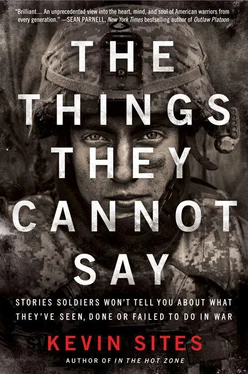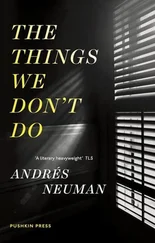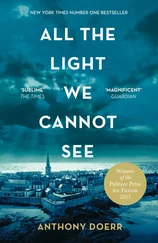Wold stopped shouting and began to calm down, perhaps beginning to realize how much of the war had actually come home with him.
“Afterward I think he was mortified that he was in a position to hurt me,” she says. “Before he left for Iraq he had a sparkle in his eye, he cared about people. He made a commitment to his country and he took it seriously. But when he came home, he was torn and tattered. I hired psychologists, everything we tried to do for him.
“On the backside of my house we have a gazebo and there’s a pond. It’s where I’m talking to you right now,” Sandi tells me. “It’s the place where you get right with the world. It’s surrounded by trees. No one can see you. He loved being here. He loved being here! He lived with us for a while, then bought a house, but after a while said he couldn’t live alone anymore. He just couldn’t do it.”
With everything he had seen and done in Fallujah in November 2004, Wold told medical professionals, he was having difficulty adjusting to civilian life and was struggling with nightmares, flashbacks and emotional numbing. He was diagnosed with severe post-traumatic stress disorder. He had also reportedly suffered from a blast injury in Iraq, which I could find few details about, but medical records indicate he was experiencing serious cognitive difficulties consistent with traumatic brain injury. [10] The Mayo Clinic says traumatic brain injury “usually results from a violent blow or jolt to the head that causes the brain to collide with the inside of the skull. An object penetrating the skull, such as a bullet or shattered piece of skull, also can cause traumatic brain injury. Mild traumatic brain injury may cause temporary dysfunction of brain cells. More serious traumatic brain injury can result in bruising, torn tissues, bleeding and other physical damage to the brain that can result in long-term complications or death.” According to the 2008 RAND Corporation study “Invisible Wounds: Mental Health and Cognitive Care Needs of America’s Returning Veterans,” as many as 320,000 of the 1.64 million U.S. troops who have served in Iraq may have suffered some form of traumatic brain injury.
Like so many other service members coming back from the wars in Iraq and Afghanistan physically or psychologically damaged, or both, Wold’s life began to revolve around a potent cocktail of painkillers, muscle relaxants and antidepressants he used to cope with his injuries.
According to Wold’s military and medical records, at some point after his return from Iraq he began abusing the powerful painkiller OxyContin and became addicted to it. Wold grew more restless and agitated, Sandi says, until the day he told her he was going to reenlist. He had been home for a year and a couple of months, much of it spent shuttling between doctors, psychologists and psychiatrists. But few were able to bring him comfort or relief. His frustration fed on what seemed perfect logic in his damaged brain: while his time with the Marines was the source of injuries, it was also the place he felt most protected.
“My brothers will take care of me,” he told Sandi.
“We tried to talk him out of it for hours. ‘Look what the Marines have done to you already,’” she says. She was desperate to keep him from returning to the place she felt had hurt him the most. “Get an education, be what you want to be. Look at where you’re at,” she pleaded.
But she says it was already too late. “He wasn’t there anymore. The sparkle in his eyes was completely gone. He was hollow.”
Sandi says things went farther downhill from there. After he reenlisted he was made a sergeant in the First Light Armored Reconnaissance Battalion, but according to her, he didn’t want to return to combat, but rather wanted to work as an armorer doing repair of light weaponry. His unit’s respect for his war service evaporated with their realization that he was addicted to OxyContin.
She claims it culminated one night when he told her that three fellow Marines jumped him while he was in his bunk in the barracks and beat him to the point that he developed a stutter.
“He was having a nightmare and they got tired of it,” is how Sandi explains it.
Wold’s addiction to OxyContin became so obvious the Marines placed him in the Substance Abuse and Rehabilitation Program (SARP) for intensive inpatient therapy. When he failed to successfully complete the program, he was put in the medical hold unit of the Naval Medical Center pending a medical discharge. In only a few short years he had gone from a fearless warrior baptized in some of the fiercest combat in recent military history to a brain-damaged drug addict about to be tossed from the ranks of those to whom he had once brought so much honor.
On November 9, 2006, Wold and two of his friends, Joshua Frey and Nathaniel Leoncio, spent the day together, which culminated in a trip to a tattoo parlor. To his seven other tattoos, Wold added one more. On the inside of his right forearm he got a multicolored design depicting a woman, an eagle and a banner reading “All American Bad Ass.”
They returned to his room around six thirty that night and planned to watch a movie. According to legal and medical reports, one of the friends watched Wold try to take his medications again and reminded him he had already done so earlier. By some accounts, Wold would do this quite often, repeating doses of medications he had forgotten he’d already taken. Wold reclined on his bed and put a pinch of dip between his gums as had become his habit before going to bed when he was deployed in Iraq. At a certain point in the evening he told his friends he was not feeling well and was starting to get cold. The friends left around eleven thirty P.M. with promises to return in the morning for a camping trip they had planned for the weekend.
When Frey and Leoncio came back nine hours later and knocked on his door, there was no response. They contacted the front desk at the medical facility and got security to let them in. They said they found Wold in the same position they had left him in the night before, lying on his back in his bed, his dip cup on his chest. But now he wasn’t breathing. Frey and Leoncio began CPR until paramedics arrived and transported Wold to the emergency room of the Balboa Naval Medical Center. He was already cold to the touch. They noticed a pink, frothy sputum in his mouth.
Despite interventions by the medical staff, they couldn’t get him breathing or his heart beating again. An hour later, at nine thirty-five A.M., he was pronounced dead. William Christopher Wold was twenty-three years old. The day was Friday, November 10, 2006, just two days before the two-year anniversary of the day he had shot the six Iraqi men in the mosque and then spoken to me outside on the streets of Fallujah.
While I had always remembered my interview with him on that day, I didn’t find out what happened to him until a year after his death. I had been working with my friend Jeffrey Porter on a documentary about the war in Iraq when he mentioned the footage of Wold he had been screening. We planned to use it in the film but wanted to follow up with him first. Porter made some inquiries with some of the guys from the unit and was told that Wold had committed suicide. We were both stunned. As I knew him, during our short time together, Wold seemed the very opposite of death, fully alive and animated, conflicted but honest. He was the killer that he was trained to be, but an almost impossibly vulnerable one. As I knew him, Wold did not seem to me like the kind of guy who would voluntarily take his own life. He had a clearly defined sense of purpose and duty and was too connected to his family. We shelved the documentary project for lack of time and finishing funds and went on to other things. But when I began writing this book I wanted to revisit the life of William Christopher Wold. I wanted to talk to his family and get more details about what had happened after he returned from Iraq. But first, I got copies of the San Diego County medical examiner’s investigative, autopsy and toxicology reports. What I discovered seemed in some ways even sadder and more shocking then the thought of his suicide. Wold, it seemed, had died from an accidental drug overdose.
Читать дальше












